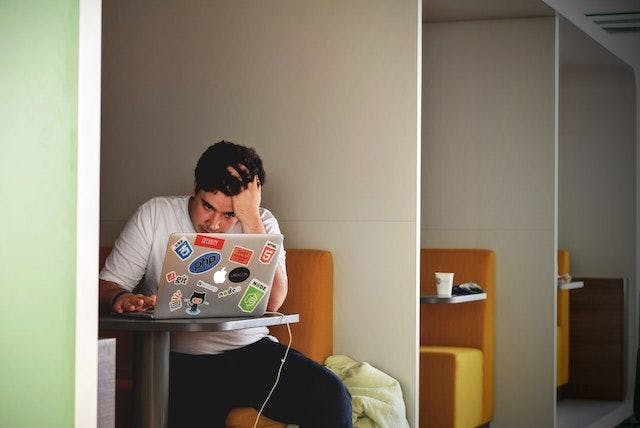You’re sitting at a cafe, having coffee with friends. The mood is good, the conversation is flowing, but suddenly out of nowhere your heart starts racing.
There is a faint ringing in your ears and a slight dizziness overcomes you. Instead of enjoying the moment, you find yourself mentally removed, hyper-focused on the physical sensations, no longer present with your friends. As your worry increases, so do the uncomfortable symptoms, and within minutes, you’re spiraling into an anxiety attack.
Is some anxiety normal?
Anxiety can feel scary and isolating, but the scenario above is much more common than you think. Nearly 20% of the US population suffers from anxiety. Take a look around you – one in five individuals may be having anxiety right now.
Anxiety is so common, that it is best described as simply a human condition. Anxiety is a natural response to stress, a trigger that signals the brain to adjust the body’s physiological functioning. For example, it is natural to feel some anxiety before a big exam or a first date. The problem is when anxiety gets out of control, and anxiety attacks happen frequently. In more extreme cases, it can develop into an anxiety disorder.
Why do I get anxiety for no reason?
Let’s say you are walking home at night, and a suspicious-looking stranger is coming towards you. Your muscles tense, your breathing becomes rapid and shallow (to increase blood oxygen levels so you have more energy), your palms sweat and your mind becomes blank.
This is known as the “flight or flight response” and it is completely normal. It serves an important purpose to keep you aware of imminent threats and safe from danger.
Anxiety is when this normal response to stress goes a bit haywire. Your nervous system has become overly responsive, and anxiety is triggered by even the most benign events. During anxiety, your body responds to perceived danger, rather than actual danger.
That’s why anxiety can happen even at moments when you seem to be relaxed and okay. One minute you are chatting with friends over coffee; the next minute, you are dealing with the unpleasant and uncomfortable sensations that come with anxiety (often without knowing why).
What are some common anxiety triggers?
Anxiety does not happen in a vacuum. There are several possible reasons why you feel anxious and your nervous system is extremely sensitive. Not all of them are related specifically to stressful events. Let’s take a look at what can trigger anxiety, so you can be better informed and prepared.
1. Anxiety disorders
Probably the most common reason why your anxiety is triggered is because you have an anxiety disorder. People who develop anxiety disorders have usually been under prolonged and chronic stress. Their nervous systems have become hyper-sensitive and primed to anxiety. Even small, seemingly insignificant stressors can trigger anxiety.
With an anxiety disorder, the anxious response can happen unconsciously, without the individual even being aware of feeling stressed. When the brain is constantly ready for “fight or flight”, then even a subconscious thought or association can cause the anxiety response to occur. A small remark, a flash of memory or a song playing in the background could trigger anxiety if you have an anxiety disorder.
2. Genetics
Your genes are responsible for your height and hair color, and yes, genetics also play a role in whether you are likely to have anxiety. More specifically, scientific research has shown that there is a moderate 30% risk of “inheriting” the tendency to be anxious.
Anxiety is also affected by personality traits, that people are born with. For example, people who have more sensitive personalities may be more prone to anxiety. Additionally, one’s childhood and relationships with parents in their younger years have a major impact on how anxious they may be as adult. It’s not just your genes!
Unlike height and hair color, anxiety is a mind-body response, which means you have some control over whether you will develop anxiety. Even people with a strong genetic tendency to anxiety, or an anxiety-prone personality, can learn the skills and techniques to manage stress and minimize anxiety in their lives.
3. Trauma triggers
For people who have endured trauma in their lives, the “fight or flight” response may be ready to kick in whenever a trigger for that trauma arises. Instead of responding to stress with an appropriate reaction, past traumas can trigger a much deeper fear that – if left untreated – can develop into anxiety.
For example, an individual who grew up in a household where even minor mistakes were harshly punished may develop into a perfectionist adult who sets impossible standards for themselves. When they fall short of their self-imposed standards (ie. they miss out on a job promotion), this can trigger anxiety. The anxiety is not really due to the current situation, but rather a response to a deep-seated and unresolved trauma from the past.
4. Certain foods
While anxiety is typically considered a mental health issue, it is more accurately described as a mind-body phenomenon. Anxiety is triggered in the brain, which directs the body to adapt its physiology in response. However, it can sometimes work the other way too.
Changes in the body can cause physiological reactions, which then trigger the brain to enter the anxiety loop. That’s why anxiety is one of the common symptoms of hormonal changes in women, such as before the menstrual period or during perimenopause. It is also why certain foods can trigger anxiety.
The foods known to trigger anxiety are stimulants, such as coffee, other caffeinated beverages, and alcohol. Foods that are high in sugar, or high glycemic, meaning they cause a rapid rise in blood sugar, are also associated with anxiety. Sweetened beverages, like soda and cocktails, candies, popsicles, and other sugary foods and drinks can all contribute to anxiety. People who are prone to anxiety should avoid them when possible.
5. Physical health problems
A person suffering from health problems may find that anxiety is among the symptoms they are experiencing. This is usually due to the stress caused by the medical issue. For example, a person who is in chronic pain due to an illness may develop anxiety as a result.
A person who has migraines may develop anxiety around the fear of when their next episode will strike. People with physical health problems may have related issues, such as insomnia or side effects from medication. These can all be a trigger for anxiety or can be what makes anxiety worse.
When a person is anxious, they may experience a range of uncomfortable physical symptoms, such as dizziness, rapid heart rate, muscle tension, and sleep difficulties. People who are having medical issues sometimes find it difficult to determine whether a symptom is due to their condition or their anxiety. This can be a source of extra stress and trigger or worsen anxiety.
Why do I feel anxious all the time?
If you are asking this question, then it is time to start figuring out what is causing your anxiety. The list of anxiety triggers above covers the main reasons why people get anxiety attacks.
There is no formula, and the causes of anxiety are different for everyone. Only by delving into your inner world and lifestyle can you discover what triggers your anxiety so you can begin to deal with it and get on the path to a calmer, less-triggered life.
Read more on how to treat anxiety without medications.






